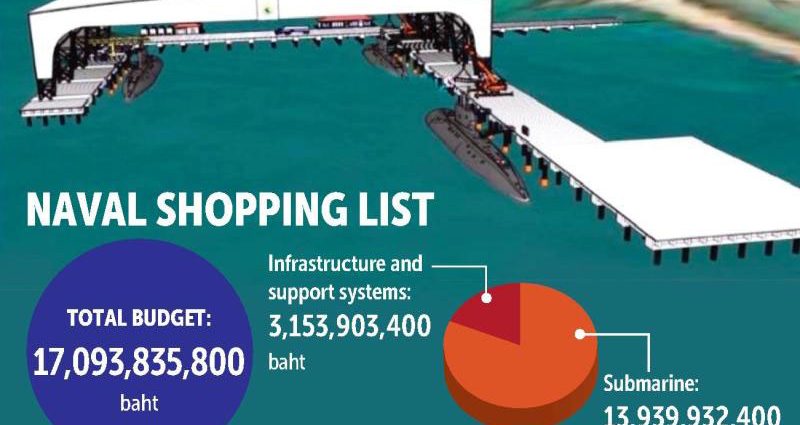Govt fingerprints all over navy’s axing of deal with manufacturer in China, writes Wassana Nanuam
PUBLISHED : 28 Oct 2023 at 06:22
NEWSPAPER SECTION: News

The Pheu Thai-led government’s decision to acquire a Chinese-made frigate instead of a submarine in the wake of problems and delays with the original purchase came as no surprise following Pheu Thai’s intense scrutiny of the scheme.
The submarine deal remained in limbo for months after it was revealed that China had failed to procure a German-made MTU 396 engine for the submarine on order and offered the Chinese-made CHD620 engine instead.
According to the original agreement signed in 2017, Thailand was to use the German-made engine in an S26T Yuan-class Chinese submarine it ordered from China. However, Germany now forbids engines made domestically from being used in Chinese military hardware, so China proposed that a Chinese-made engine be used in the submarine.
After several rounds of negotiations and assurances that the Chinese engine would be up to the task, former navy chief Adm Choengchai Chomchoengpaet said before his retirement, the navy was prepared to recommend the Chinese-made engine.
As it turned out, the government decided not to proceed with the submarine procurement and proposed to buy a Chinese-made frigate as an alternative.
Considering Pheu Thai’s criticism of the purchase when it was in opposition, it was foreseeable that the project would not see the light of day upon coming to power.
“There has been no order from the government or the Pheu Thai Party. It is a solution worked out by the Defence Ministry and the navy,” Defence Minister Sutin Klungsang said.
However, a naval source said the frigate proposal was drawn up following the meeting between Mr Sutin and the navy. To avoid being associated directly with the party, Mr Sutin reportedly instructed the navy to explore alternatives if the submarine deal could not go ahead, the navy source said, which was confirmed by a source in the Defence Ministry.

According to the naval source, the navy, therefore, came up with two proposals — one was to buy a Type 054A Jiangkai II frigate, and the other was to purchase a Corvette Type 056 Jiangdao offshore patrol vessel (OPV).
However, the navy already has seven frigates in its fleet, with the Prayut Chan-o-cha cabinet approving its plan to acquire a new one with an estimated cost of 17 billion baht in the 2024 fiscal year.
While the new frigate project is not yet finalised, South Korea is said to be high on the tentative list of suppliers. The navy’s seventh frigate — HTMS Bhumibol Adulyadej — was built by South Korea under a budget of 14.9 billion baht and commissioned in January 2019.
According to the source, the submarine is essential to the navy’s strategic and defence capabilities plan, although the number is reduced to one from originally three. China is obliged to take responsibility and compensation for its failure to fulfil the contractual requirement.
The navy had held talks with China Shipbuilding & Offshore International Co (CSOC), which is contracted to build the submarine under a government-to-government agreement, but the firm could offer only free spare parts for eight years and free training.
If the government agreed with the change from the German-made engine to the Chinese-made engine, it would have been expected to lobby China to hand over two second-hand submarines to Thailand for training as it awaited the purchased submarine’s completion and delivery in about three years.
“CSOC never responded to the second-hand submarine request, so that issue would have needed to be handled by the government. The second-hand submarines are part of the Chinese navy fleet, not owned by the firm,” said the naval source.
It is possible that the Pheu Thai-led government will consider a new submarine acquisition scheme after Mr Sutin expressed his interest in a German-made submarine under a barter trade agreement, the source said.
Mr Sutin’s decisive role in scrapping the Chinese-made submarine deal has several political analysts reassessing the defence minister and his role in military affairs, particularly military reforms.
The S26T Yuan-class submarine was originally due to be delivered to Thailand this year, but the pandemic had postponed its delivery to next April.

